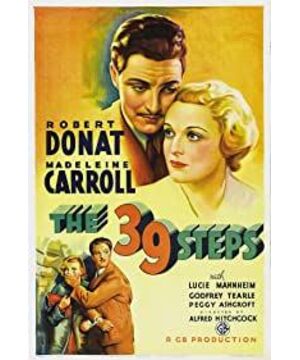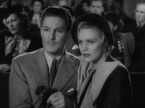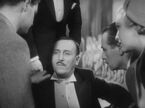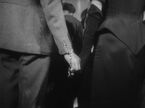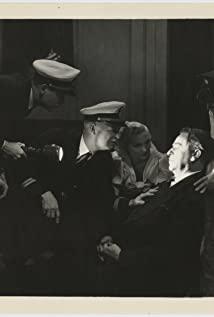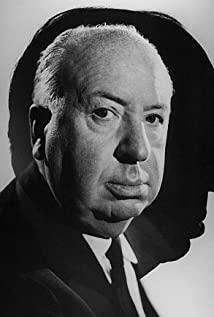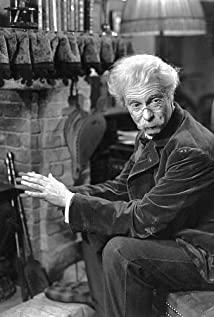may be because the narrative literature (fiction) has been fully developed and reached a considerable height when the film appeared, and the development of the drama feels like an overnight thing.
For example, Hitchcock's "Thirty-Nine Steps" from 1935, how many films can now be more precise and rapid than its rhythm, putting such a large number of plots in such a short period of time, while remaining organized and fascinating?
Even Hitchcock himself, some of his works from the 1940s and 1950s are not as good as this one.
There are mainly three female characters in this film: the female spy Anna Bella Smith, the farmer’s wife Margaret, and Pamela who was kissed forcibly on the train.
1. The female spy was the reason Hanna got involved in this conspiracy: it was she who shot in the theater, was hugged by Hanna amidst the crowds, and asked Hanna to take him home after she walked out of the theater. (The more paradoxical thing is that after going around a big circle, the clues about the conspiracy finally returned to the theater.) Her death also directly caused Hanna to be arrested as a murderer.
The female spy claims that she has no country and serves whoever pays more. Anna Bella Smith’s name is just a pseudonym that can be changed at will. Coupled with the extraordinary caution in Hanna's home, it seems that she is a professional spy who wanders on the edge of morality. But the clues that Hanna entrusted to Hannah before her death revealed her inner patriotism as a British (otherwise, she would have to die and still have to deal with what tasks).
Her death is also the most dramatic part of the film, and the task of preventing the leakage of secrets has been transferred to Hanna, who has nothing to do with it.
2. Kissing Pamela on the train also failed to persuade him to help him through the crisis. Hanna came to a farmer's house and prepared to take a rest before heading to the "professor's house circled by the female spy on the map of Scotland". The farmer's wife Margaret (Hanna asked her name before leaving, and of course kissed her) played a key role in this passage. She grew up in the city but married in the country, doing housework for a husband who is much older than herself (Hanna thought she was the daughter of a farmer when she first met her) and also endured his jealous character and constant family Violence.
It was she who gave the farmer's (son) coat to Hannah, and it was the "Bible" in the coat that blocked the professor's bullet. When Hanna and the police explained the situation, the film inserted a scene where a husband found that his coat was missing and beating his wife. To do this in such a tight-paced film, I have to say that the farmer’s wife is too sympathetic.
3. Pamela appeared in the train box while reading a newspaper with glasses. This image is in sharp contrast to the beauty after taking off the glasses. (Hitchcock seems to like this very much, also in "Rear Window") And the dramatic plot of Hannah's eagerness to be kissed as soon as he appeared on the stage, people expected her to help the actor later, but unexpectedly she immediately Report to the police.
When the audience was pity that such a beauty turned out to be just a cutscene, Hanna had to give a speech in order to avoid the police breaking into the political speech venue and was mistaken as the guest Captain Fraser who was soliciting votes for the candidate. At this time, Pamela and the real Captain Fraser came with him, and she exposed Hanna again. Afterwards, they were taken away by the professor's thugs. Pamela was gradually moved by Hannah when he was held hostage. She was very happy when she learned that the truth was exactly what Hannah said, and finally helped Hannah wholeheartedly.
It may be helpless for the female spy to entrust the task to Hannah, but from the perspective of the development of the matter, it is very insightful. Hanna is a very gentleman, well-informed and charming. He is passionate about women, helping female spies, taking the initiative to talk about London with the farmer’s wife, and helping Pamela to bake wet socks. He is both gentleman and funny. The passage of making up his family's criminal history on the hotel bed is a classic. He was idealistic, kind-hearted and brave. He did not call the police but followed the words of the female spy to investigate and prevent the leakage of secrets. He gave speeches at the speech venue on building a new and beautiful world, escaped from the police thugs several times, and asked before leaving the farm. The name of the farmer’s wife...
Finally, the truth came to light, and the hands clasped with Pamela finally gave the flower protector a happy ending.
It is worth noting that the female spy, the farmer’s wife, and Pamela correspond to the three typical females of "bad women", women trapped in the family, and urban new women respectively. It also involves issues of international political struggles and the duality of urban and rural areas.
"Bad women" are too dangerous (Sophie Marceau will be killed in 007), destroying the family is offensive to God, and only the exquisite beauty who grows up in the city is the eternal home of all adventurers.
View more about The 39 Steps reviews


